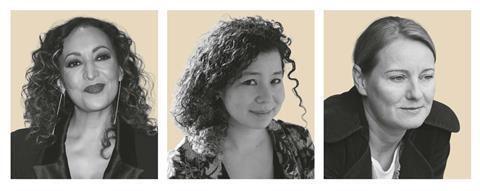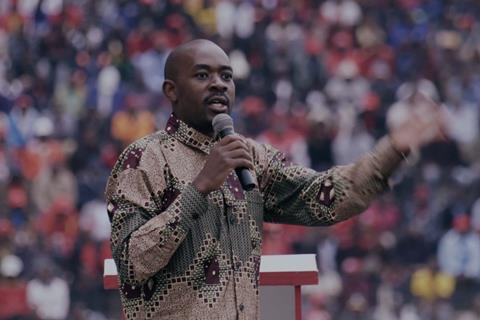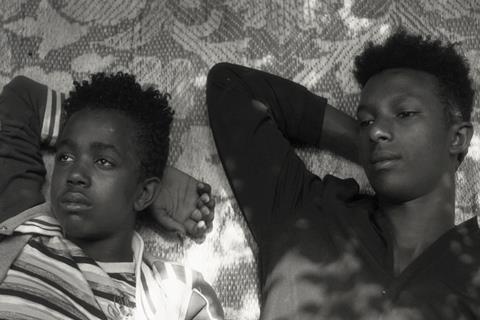Jessica Beshir, Jessica Kingdon and Camilla Nielsson, directors of Oscar-shortlisted documentaries Faya Dayi, Ascension and President discuss their individual journeys to tell global stories.

This year’s Oscar shortlist for best documentary feature offers a remarkable mix of subject matter and approach that shows the depth and richness in non-fiction filmmaking. The shortlist is especially notable for its global breadth of subjects, including Nanfu Wang’s In The Same Breath (looking at the early days of the coronavirus outbreak in China and the US), Megan Mylan’s Simple As Water (spotlighting Syrian refugees in Greece, Turkey, Germany and the US) and Rintu Thomas and Sushmit Ghosh’s Writing With Fire (about crusading female journalists in India).
Also on the shortlist are Ascension, President and Faya Dayi, and it is the directors of these three titles that Screen International invited to come together for a conversation about their experiences and contemporary documentary practice.
Faya Dayi is the debut of Ethiopian-Mexican filmmaker Jessica Beshir, a deeply personal, impressionistic black-and-white mood poem that reveals the destructive effect of plant stimulant khat on her homeland of Ethiopia. Ascension is the debut feature of Chinese-American director Jessica Kingdon, an observational look at the pursuit of the Chinese dream through its labour force, consumer culture and wealth disparity. And President is Danish director Camilla Nielsson’s follow-up to the acclaimed Democrats, her 2014 film that followed Zimbabwean politicians as they wrote the country’s new constitution. President chronicles Zimbabwe’s 2018 presidential election and bloody aftermath as charismatic opposition leader Nelson Chamisa battles both Zanu-PF candidate Emmerson Mnangagwa, a one-time minister in the government of Robert Mugabe, and a corrupt system.
Screen International: All three films take very different approaches to stories in Africa or Asia. What was it about your subject matter that appealed to you?
Jessica Kingdon: In 2017 I made a short, Commodity City, which takes place in the largest wholesale mall in the world [in the Chinese city of Yiwu, Zhejiang province]. From there I became interested in making a film about the hidden economies that power day-to-day, consumer-driven life. Initially, I was looking more at the cycle of production, consumption and waste. But, as I was shooting, [Ascension] became a story of upward mobility and materialism in contemporary China, which mirrors the so-called western world.
Jessica Beshir: I grew up in Hadar [in Ethiopia], where I shot [Faya Dayi] and was uprooted from as a teenager. My family had to move due to the violence of the communist regime. Going back to reconnect with family, with friends, with that life, was an incredible experience. I felt like I was meeting this place anew, so much had changed. Driving into Hadar there was the shock of seeing this green blanket of khat. It’s always existed, but not to this extent, where no other crops were visible. Beyond that was the impact it was having on the social fabric. There were so many layers I started to find through the lens of khat that I wanted to make this film.
Camilla Nielsson: Democrats was banned by Mugabe and his censorship board, which was surprising because it was a very unbiased film. And he banned it just after he had signed the new democratic constitution, ensuring freedom of speech. Some of the lawyers I had met while filming suggested we challenge the ban in the courts. It was a laborious process that took three years. I was blacklisted for the three years — I couldn’t even enter the country — but they gave me a 24-hour diplomatic passport to be part of the hearing. And when we went out to celebrate its unbanning, [the opposition party] said: “Mugabe’s gone. We’re about to head into a presidential election, we think we can win, and would like you to document that historic election.”

Documentaries require people to open their doors to you and your camera. How did you go about winning their trust?
Beshir: The first time I [went] into the khat farms, one of the farmers recognised my father, who used to be a doctor there. That was the first family I was introduced to. And from there, they were incredibly welcoming. They gave me their trust and opened their doors. A lot of the people I knew from when I went to school there, some were introduced through friends of friends. So it was not that difficult to have these intimate relationships with the communities.
Nielsson: We only got the permit [to make President] four weeks before the election and, working observationally, usually you need time to gain trust and do research for your story. But because of Democrats and the trust we already had, we could go right in on the first day and film whatever happened.
Kingdon: I was surprised by the access that we gained. But since we weren’t doing anything that was overtly political or “sensitive”, we were able to be very transparent about being an American documentary crew making a film about China’s economic rise. We didn’t go in with a specific agenda. It was about observing people. And for every place that said yes, there were dozens that would say no. Once we were there, we would ask which people were comfortable being filmed and which weren’t, and were mindful of that.
Once you were in, did anyone try to stop you filming?
Kingdon: They did. In the sex-doll factory, there was one room that looked absolutely horrifying and they didn’t want us to shoot there — because that was their proprietary technology, and they didn’t want other companies to see and use it. One CEO accused us of being corporate spies. We had to prove we were just these weirdo filmmakers by showing him videos I made in grad school seven years ago.
Did you encounter any government opposition?
Kingdon: We went on tourist visas. We were like, maybe we are just making an amateur YouTube video. That was the mindset I [went] in with.
Nielsson: After Democrats, my cameraman Henrik Bohn Ipsen and I were known faces, so we were tolerated by the system. But it was subtle things like our press credential being checked two or three times, so we would miss the beginning of a press conference. I boom, I make my own production sound, and it’s the boom that directs the camera, so when intelligence people would take me to the side and ask all these questions, my cameraman’s kind of on his own.
How easy was it to secure funding?
Kingdon: We were pretty lucky. We got more grants than I expected. The initial funding came from a loan from our sales agent Visit Films, even before we had any footage. Without that, I don’t know if we would have been able to make the movie because that enabled us to go on our first trip. From there, we got our first grant, from SFFilm. That allowed us to keep editing, keep translating footage, keep making more media samples, and it was this back-and-forth dance between shooting, editing, submitting to more grants, shooting, editing, submitting to grants. Through SFFilm we got some investors. Then XTR gave us the finishing funds. Part of it might have been because people are interested in China now. I think I hit this sweet spot of right time, right place.
Nielsson: I was in the middle of another project. It had been funded, and I had spent a year and a half getting access to the story when they asked me to make President. I said that I think it’s not possible for me to swap things around in four months. But my producer, Signe Byrge Sorensen, convinced the people who funded the other film to transfer it straight into President. Also, my cameraman, producer and I worked without pay. We used the money we had to cover flights, cameras and expenses in Zimbabwe, and we’ll pay ourselves when we make money someday. These projects are projects of love, they’re activist projects. They’re not what pay the bills.
Beshir: I didn’t know anyone in the industry to begin with, and the few people I spoke with wanted to make another type of film. From 2011‑18, I was trying to go [to Hadar] every year to shoot as much as possible because I live in Brooklyn. In 2018, I got my first grant from the New York State Council on the Arts, so I was able to upgrade my equipment. After that the Jerome Foundation grant was the first big institutional one I was able to get. Then came the Sundance grant and one from the Doha Film Institute. I also got an investor, Neon Heart Productions, and finishing grants from XTR.

Ascension, Faya Dayi and President are stylistically very different. What inspired the way you shot your film?
Nielsson: When I went to film school, I saw Salesman by Albert Maysles [also by David Maysles and Charlotte Zwerin] and the nowness of his camera and the sensitivity in his gaze inspired me to tell stories this way. There’s a challenge in being there in the moment, where the coincidence and randomness and the gifts you get from reality is far more exciting than something I can think up and plan from home. I’ve never done a film where I do interviews or reconstructions. All my films have worked observationally, and that’s inspired by Albert Maysles and Frederick Wiseman. I was lucky enough to have Albert Maysles give feedback on my first student film. He invited me to join him on several of his shoots and became a mentor. He kind of loved all his subjects and I learned a lot about having relationships with the people you film. I try not to make villains in my stories. That’s something else I learned from him — to look for the humanity within.
Kingdon: Like Ascension, Workingman’s Death [Michael Glawogger’s 2005 documentary] is also a series of vignettes around the world without characters or plotline to take you through it, which made me feel I could do something like that. Nikolaus Geyrhalter’s Our Daily Bread was another influence in terms of the aesthetics, as was Wang Bing’s Bitter Money, which is a mostly observational doc about factory workers.
Beshir: Within the multiple layers I was trying to convey in Faya Dayi, there’s so much that’s also intangible. The spirituality is so present. The ritualistic nature around this plant is so present. So how do I bring that to film? I wanted to focus on the rhythms of life. Black and white was a choice from the beginning. Hadar is incredibly colourful, but I didn’t feel like that’s where the story was. I found it more poignant to bring those shadows, those textures and how they embody the fear that exists.
How important has the festival circuit been in terms of securing distribution?
Kingdon: Ascension premiered at Tribeca [2021] and won best documentary. That set it off on a whole trajectory. After Tribeca, MTV [Documentary Films] bought it. This has been great because it’s setting me up to be able to make another project the way I want.
Beshir: My prayer after 10 years was to finish the movie, that’s all I wanted. And from Faya Dayi’s launch at Sundance [2021], it’s been an incredible journey. Janus Films took North American rights and we got distribution for Latin America and major territories in Europe by Mubi. We started our theatrical journey at the Lincoln Center in New York, which I’ve been going to for years, watching all these incredible films. To see my film there was just… wow.
Nielsson: President premiered at Sundance [2021], and then it screened all over the world and won numerous awards. Thandiwe [Newton] saw the film at Sundance and was moved by the story and offered to come on board as an executive producer. Danny Glover is a producing partner of our US producer Joslyn Barnes and also offered to come on board as an executive producer and help get more eyeballs to the film. They’ve been very helpful for the film to come out. We had a theatrical release in the US in December [via Greenwich Entertainment]. It’s filmed in Scope, and we felt it’s a film made for cinema, so there’s been a lot of focus on screening and premiering in cinemas and not on streaming platforms.

Was there a moment that you decided on this career?
Kingdon: There’s no traditional path to becoming a documentary filmmaker, it’s a job you must force yourself into or create yourself. I was working on the fringes of the film industry as a videographer, making my own low-budget projects on the side. But watching films like Sweetgrass [by Lucien Castaing-Taylor and Ilisa Barbash, 2009] or Leviathan [Castaing-Taylor and Véréna Paravel, 2012] opened up for me what a documentary could be and made me realise that maybe this is something I want to pursue.
Beshir: I had an idea I wanted to make a film at some point, but I didn’t know how or what that would be until I went back to Ethiopia, because all these images in my head were coming from that place. Once I reconnected with family and friends, that’s when I decided to make this documentary. And when I say documentary, it was going to be based on the reality that surrounded me.
Nielsson: My first introduction to filmmaking was as an intern in the art department at the [UK’s] National Film and Television School. I was 18 and saw the set-up it required to shoot one scene, and it lost the magic. That moment where the director was with the actors was so short. So I looked at documentaries and came to New York. At Tisch [New York University’s Tisch School of the Arts] I was introduced to ‘direct cinema’ and that American tradition of storytelling. I’ve been telling stories like that ever since. I don’t like the term ‘cinéma verité’, I use ‘observational cinema’ or ‘fly in the soup’.
What does it mean to be on the Oscar shortlist?
Kingdon: It’s a shock since I never expected the film to have this kind of reach. The awards thing feels very goal-oriented. But I’m incredibly grateful because I don’t know that this will ever happen to me again, so I’m trying to approach it with openness and curiosity. It was also heartening to see there’s several women of colour on it — with Writing With Fire and In The Same Breath. Also, these films are unconventional documentaries. It’s not like these are films that check off a lot of the conventions of what a documentary should be.
Beshir: I agree. This is an incredible moment to realise you took your chances, you listened to your instinct, you went with your gut, and here we are with a very unconventional documentary and yet, somehow, being recognised for it. We’re bringing our own voices into the landscape and being rewarded for that creativity.















![[L-R]: Amanda Villavieja, Laia Casanovas, Yasmina Praderas](https://d1nslcd7m2225b.cloudfront.net/Pictures/274x183/6/4/1/1471641_pxl_20251224_103354743_618426_crop.jpg)




![[L-R]: Amanda Villavieja, Laia Casanovas, Yasmina Praderas](https://d1nslcd7m2225b.cloudfront.net/Pictures/100x67/6/4/1/1471641_pxl_20251224_103354743_618426_crop.jpg)




No comments yet